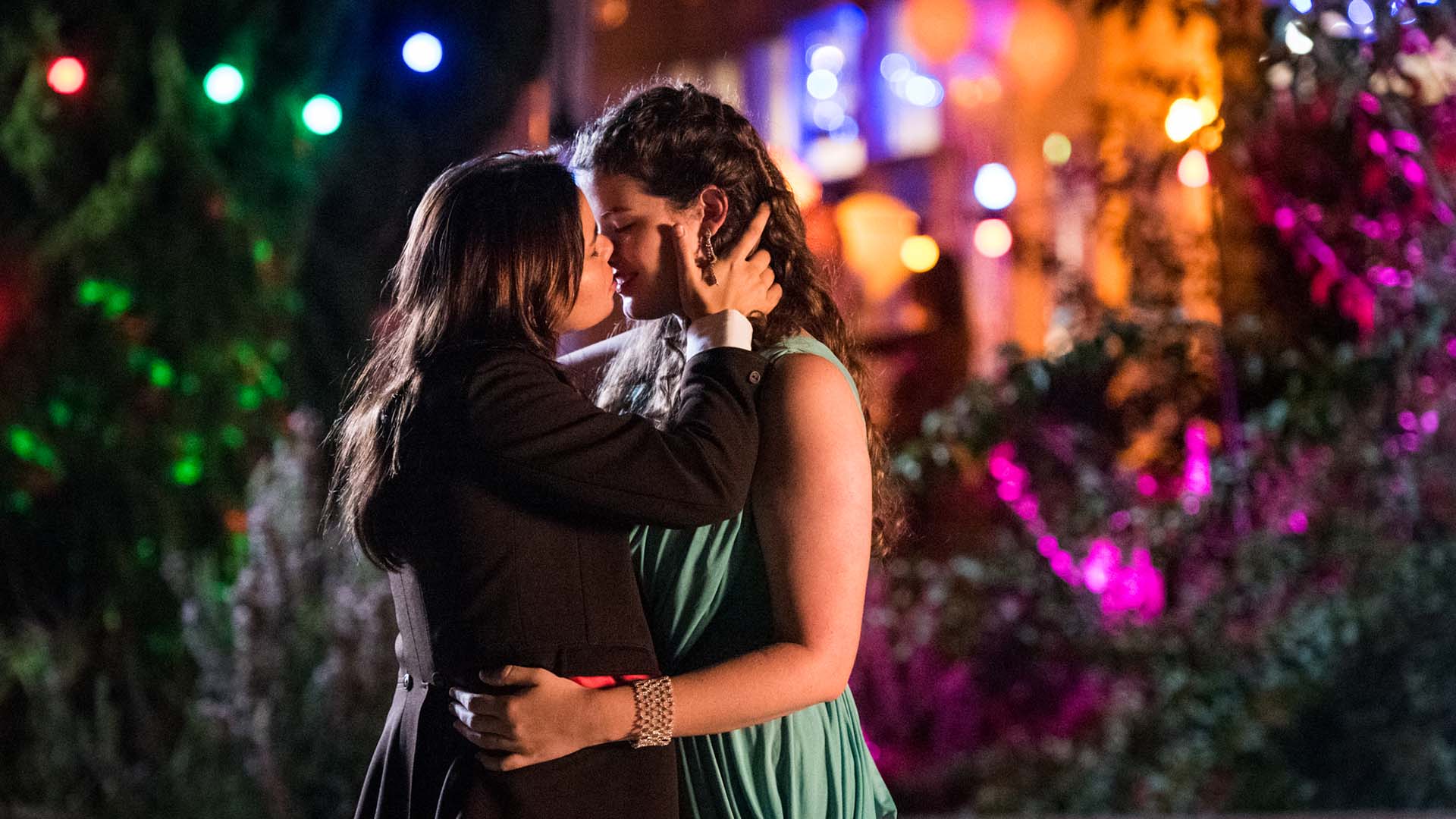Ellie and Abbie (and Ellie's Dead Aunt)
Shot and set in Sydney, this proud, contemplative and engaging teen queer rom-com gives Aussie cinema something that it's been missing.
Overview
As a teen rom-com about two high schoolers working through their attraction for each other as they're also trying to work out what to do with their lives and how to simply be themselves, there's a strong sense of familiarity about Ellie and Abbie (and Ellie's Dead Aunt). It's the kind of movie that viewers will initially feel they've watched before. Audiences will spot the tropes and conventions, the scenarios and exchanges they've seen in other tales about adolescent troubles and related affairs of the heart, and the kinds of characters that typically populate classrooms and families in seemingly similar films. Here, however, this isn't a sign of laziness. Ellie and Abbie (and Ellie's Dead Aunt) wants you to register how much it resembles other entries in its genre — because it wants you to notice what it's doing differently. Of course, unfurling a queer romance within such well-worn confines shouldn't be such a remarkable act (and an Australian teen queer romance at that), but it still currently is.
There's a purposeful sense of clumsiness about Ellie and Abbie (and Ellie's Dead Aunt), too. Again, that's by design. Studious school captain Ellie (Sophie Hawkshaw, Love Child) has a simmering crush on the far cooler, calmer and more collected Abbie (Zoe Terakes, Janet King), but is struggling to stump up the courage to ask her to the school formal. In fact, she even goes as far as willingly and uncharacteristically getting detention so that she spend more time with Abbie, all to try to muster up the motivation to pop the quintessential high-school question. And when the pair do slowly start becoming closer, Ellie doesn't know exactly what to do, or what's expected, or how to be the person she wants to be in her first relationship. Complicating matters is the distance she feels from her mother, Erica (Marta Dusseldorp, Stateless), as she navigates such new emotional terrain — oh, and the fact that, as the title gives away, Ellie's dead aunt Tara (Julia Billington) suddenly starts hovering around and dispensing advice about following her feelings.
So far, so sweet. Whether you think of Tara as a queer fairy godmother or a lesbian guardian angel, her wisdom-imparting presence is tender and thoughtful — and funny and often awkward, as you'd expect when the ghost of a dead relative pops up every now and then to try to help someone through situations they don't inherently know how to deal with. First-time feature writer/director Monica Zanetti plays the scenario affectionately and humorously, and also to reflect how having a guiding light is usually a purely fantastical concept for uncertain teens. And, if the filmmaker had left Ellie and Abbie (and Ellie's Dead Aunt) there, that would've been understandable. The film would've been entertaining and understanding, cute and creative with its teen romance, and proudly celebratory of LGBTQIA+ perspectives. It's still all those things, but Zanetti's decision to open the door to a deeper contemplation of Australia's historical treatment of the queer community gives considerable depth and weight to a movie that mightn't have earned those terms otherwise.
If Ellie and Abbie (and Ellie's Dead Aunt) was being shot a few months from now, when Sydney is slated to become home to an 90-metre-long rainbow footpath through Surry Hills to commemorate Australia's marriage equality legislation — and to mark where more than 30,000 Sydneysiders gathered together to hear the results of the country's postal vote survey on the matter — the brightly coloured stretch of pavement would've surely featured in the film. Zanetti's brightly shot movie has a strong sense of place, but without including all of the usual landmark shots that make many features feel like tourism campaigns. More importantly, it has a clear understanding of what LGBTQIA+ Sydneysiders have weathered in past decades. That activism is layered throughout the film in an overt subplot and, while it's hardly treated with nuance, it's a powerful inclusion. Simply by reaching local cinema screens, Zanetti's feature makes a statement, but it also pays tribute to all the statements made in big and bold ways — and with tragic and painful outcomes, too — to get to this point in Australian queer history.
Ellie and Abbie (and Ellie's Dead Aunt)'s intentions, approach and even the importance of its very existence can't completely patch over its weaker elements, however. That lack of subtlety is pervasive, and occasionally the deliberate use of cliches and clumsiness can feel just as forceful. Some lines and ideas — Tara tells Ellie to ask Abbie if she likes AFL to get a read on her sexual orientation, for instance — are cringe-inducing rather than satirical or amusing. And despite spirited efforts by the three actors playing its titular characters, those eponymous figures are never as fleshed out as they could be, with their personalities deeply tied to and dictated by the needs of the plot. But Ellie and Abbie (and Ellie's Dead Aunt) is still a charmer, and still gives Aussie cinema something that it has long been missing. That'd be a proud, contemplative and engaging teen queer rom-com with heart, humour and a heavy awareness of the need for the kind of tale that it's telling.





